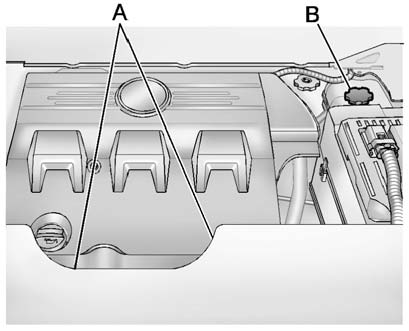Cooling System
When it is safe to lift the hood:

A. Engine Cooling Fan (Out of View)
B. Engine Coolant Surge Tank and Pressure Cap
WARNING
An electric engine cooling fan under the hood can start up even when the engine
is not running and can cause injury. Keep hands, clothing, and tools away from
any underhood electric fan.
If the coolant inside the coolant surge tank is boiling, do not do anything else until it cools down.
The vehicle should be parked on a level surface.
The coolant level should be between the MIN and MAX lines.
If it is not, the vehicle may have a leak at the radiator hoses, heater hoses, radiator, water pump, or somewhere else in the cooling system.
WARNING
Heater and radiator hoses, and other engine parts, can be very hot. Do not
touch them. If you do, you can be burned.
Do not run the engine if there is a leak. If you run the engine, it could lose
all coolant. That could cause an engine fire, and you could be burned. Get any
leak fixed before you drive the vehicle.
If there seems to be no leak, with the engine on, check to see if the electric engine cooling fan is running. If the engine is overheating, the fan should be running. If it is not, the vehicle needs service. Turn off the engine.
Notice: Using coolant other than DEX-COOL® can cause premature engine,
heater core, or radiator corrosion. In addition, the engine coolant could
require changing sooner, at 50 000 km (30,000 mi) or 24 months, whichever
occurs first. Any repairs would not be covered by the vehicle warranty.
Always use DEX-COOL (silicate-free) coolant in the vehicle.
See also:
Vehicle Reminder Messages
ICE POSSIBLE DRIVE WITH CARE
This message displays when ice conditions are possible. ...
Unlocked Door Anti Lock Out
When on, this feature will keep the driver door from locking when the door
is open. If Off is selected, the Delayed Door Lock menu will be available and
the door will lock as programmed through this ...
Sound
Press CONFIG to enter the configure menu options, then press CONFIG again, repeatedly
until Sound is selected or press the Sound screen button to make speaker and DSP
(Digital Signal Processing) a ...






